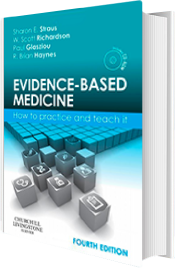You have been asked by a 25 year old male patient, who has recently recovered from a first psychotic episode, how likely he is to have further episodes of illness. He wants this information before deciding if he should take prophylactic antipsychotic medication.
There remains some uncertainty about the precise diagnosis. He does not meet criteria for DSM-IV criteria at this stage. You prefer to use these criteria because of the important negative aspects of a false positive diagnosis. Your current working diagnosis is therefore non-specific – a first episode non-affective functional psychosis.
You form the structured question “In a patient with first episode functional psychosis, what is the likelihood of remaining free from relapse in the long term?”
You search Evidence-Based Mental Health and find a 15 year follow-up study of a Dutch cohort of patients with non-affective functional psychoses. You track down the original article (Schizophrenia Bulletin 1998 Jan 24 75-85)
Read the article and decide:
- Is this evidence about prognosis valid?
- Is this valid evidence about prognosis important?
- Can you apply this valid and important evidence about prognosis in caring for your patient?
Completed Prognosis Worksheet for Evidence-Based Mental Health
Citation
Wiersma, D, Nienhuis, FJ, Slooff, C.J. and Giel R. Natural course of schizophrenic disorders: a 15-year followup of a Dutch incidence cohort. Schizophr.Bull. 24 (1):75-85, 1998.
Are the results of this prognosis study valid?
- Was a defined, representative sample of patients assembled at a common (usually early) point in the course of their disease?
- Yes – all patients in a circumscribed geographical region were included after the onset of their first ever episode of illness.
- Was patient follow-up sufficiently long and complete?
- Yes- up to 15 years
- Were objective outcome criteria applied in a “blind” fashion?
- Standard instruments were used with clear definitions of relapse although it is not clear that the follow-up was performed blind to baseline information
- If subgroups with different prognoses are identified, was there adjustment for important prognostic factors?
- Looked at a number of possible predictors of first relapse.
- Was there validation in an independent group (“test-set”) of patients?
- No
Are the valid results of this prognosis study important?
- How likely are the outcomes over time?
- After 15 years, 15% of patients had experienced no further psychotic episodes
- How precise are the prognostic estimates?
- 95% confidence interval – 7% to 22%
If you want to calculate a Confidence Interval around the measure of Prognosis
| Clinical Measure | Standard Error (SE) | Typical calculation of CI |
|---|---|---|
|
Proportion (as in the rate of some prognostic event, etc) where: the number of patients = n the proportion of these patients who experience the event = p |
$$ sqrt{frac{p times (1-p)}{n}} $$ where p is proportion and n is number of patients |
If p = 12/82 = 0.15 (or 15%) and n=82 begin{align} SE &= sqrt{frac{0.15 times (1-0.15)}{82}}\\ &= 0.039 text{ (or 3.9%)} end{align} 95% CI is 15% ±1.96 x 3,9% or 7% to 22% |
Can you apply this valid, important evidence about prognosis in caring for your patient?
Do these results apply to your patient?
- Were the study patients similar to your own?
- Yes
- Will this evidence make a clinically important impact on your conclusions about what to offer or tell your patient?
- Yes
Additional Notes
–
Psychosis: 15% Likelihood of remaining relapse free at 15 years
Clinical Bottom Line
Patients with first episode non-affective functional psychosis have a 15% likelihood of remaining free from relapse over 15 years.
Citation
Wiersma, D, Nienhuis, FJ, Slooff, C.J. and Giel R. Natural course of schizophrenic disorders: a 15-year followup of a Dutch incidence cohort. Schizophr.Bull. 24 (1):75-85, 1998.
Clinical Question
In a patient with first episode functional psychosis, what is the likelihood of remaining free from relapse in the long term?
Search Terms
hand search Evidence-Based Mental Health
The Study
Long term follow up of first-contact cases of non-affective functional psychosis from a geographically defined region in the Netherlands. At 6 months, 63% had DSM-IIIR schizophrenia or schizophreniform disorder. Explicit criteria were used for determining relapse. Data collection was standardised although much was retrospective from casenotes and informants.
The Evidence
| Outcome | Time | Measure | Confidence Interval |
|---|---|---|---|
| Relapse-free following remission of first episode | 1 year | 57% | Not calculable |
| 2 years | 45% | Not calculable | |
| 5 years | 70% | Not calculable | |
| 15 years | 15% | 7 to 22% |
Comments
Commentary in Evidence-Based Mental Health includes extra information that was obtained from authors.
Appraised By
Geddes, 1998.
Expiry Date
2000

